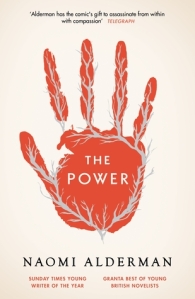
by Naomi Alderman, 2016
If women were the dominant force in society, the world would be a much more peaceful, compassionate place, right? Well, according to Naomi Alderman…not so much. The Power imagines exactly what would happen in this scenario by granting women the gift of physical superiority. While men, in general, are still bigger and more physically imposing than women, girls and young women have discovered an electric spark that emanates from their hands and allows them to control, subdue, and even kill others. It is no longer women who have to travel in packs, fearing what might reach out for them in the night, but men who tremble at the thought of being randomly assaulted. Some might say dudes had it coming, but I’m not entirely convinced of the righteousness of this world.
The book, in its ideas and its form, is a clear descendant of Margaret Atwood’s The Handmaid’s Tale, as it presents a historical chronology of how the world suddenly changed. Told through several narrators, The Power focuses on the discovery of this spark and the repercussions it has on the world. There is Roxy, searching for her mother’s killer; Allie, who becomes the spiritual leader “Mother Eve;” Margot, who, as a mayor, has to hide her spark in order to remain in a government position; and Tunde, a male journalist who is one of the first to get up close footage of the spark in action. Thought to be the result of a genetic mutation due to chemicals put in the water supply during World War II, the spark first appears in young girls who are then able to “awaken” it in the older generations. It’s not long before women are enacting retribution against the men who have wronged them, eliminating sexual predators and murderers, and overall flipping the tables of the millennia-old power dynamic.
What troubles me about Alderman’s concept of a female-dominated society is that it plays right to the fears of those who would claim that feminism aims not to equalize the sexes, but to humiliate and, ultimately, eliminate men. Don’t get me wrong, there is a part of me that took a certain amount of joy in reading about this reversal of fortunes. I found the overall consternation over the plight of males to be ironic – calling for laws to protect men, the realization that they’re nothing more than sperm donors, requiring all men to travel under the protection of a woman – as these are things all women must deal with today and they would certainly be given more thought if men were the subjects of such “protections.” Ultimately, though, I was appalled by the abject violence committed by these newly powerful women. Torture, rape, murder – in Alderman’s world, women are just as depraved as their male counterparts, which means what? That humans, in general, are terrible creatures? That, no matter who has the power, they will always aim to rule? Is humanity just that screwed up?
If The Power answers any of these questions, it seems to be in the affirmative. There are no heroes here, no one side to root for. Where The Handmaid’s Tale is a formidable warning, The Power simply comes to the conclusion that we’re all just terrible beings. I suppose that’s not an untrue statement, but I yearned to find a glimmer of hope that the oppressed may never become the oppressor, that we might overcome our past to create a better future. If history, and this book, tells us anything, that is nothing more than a pipe dream.
{Winner: Women’s Prize for Fiction 2017}
This book sounds fascinating, but it does also seem really dark in the conclusions it leads to! You raise some really great points about things that are troubling about it.
LikeLiked by 1 person
Thanks! I’ve heard many positive reviews, but it definitely warrants some thinking about what the reversal of power could possibly lead to.
LikeLike